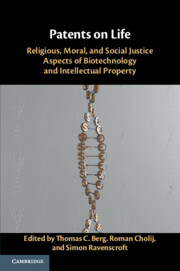 Patents on Life
Patents on Life from II - Religious Perspectives on Life Patents
Published online by Cambridge University Press: 28 September 2019
In the early 2000s the Holy See submitted papers to the WIPO and the WTO, on the subject of Intellectual Property (IP) rights, genetic resources, traditional knowledge, and access to medicines. This chapter develops some concepts that are mainly implicit in those papers. Catholic Social Teaching does not address directly the subject of IP rights, but contains all the elements for a moral judgment on the present system of IP rights. The chapter develops the discussion in three parts: first, some ideas about private property and the universal destination of goods, and the right to knowledge; second, proposing a vision of IP rights in the light of the aforesaid principles about property in Catholic Social Teaching; third, examining the issue of IP rights in relation to the rights of native peoples. The essay concludes by arguing that, to ensure that patents serve the universal destination of goods and the common good, a new legal theory should be developed in this area. This would reconsider, especially, rules relating to the public availability of the invention, the right price of the licenses, possible exceptions to the patent, means of technological transfer, and the creation of alternative means of industrial knowledge protection.
To save this book to your Kindle, first ensure [email protected] is added to your Approved Personal Document E-mail List under your Personal Document Settings on the Manage Your Content and Devices page of your Amazon account. Then enter the ‘name’ part of your Kindle email address below. Find out more about saving to your Kindle.
Note you can select to save to either the @free.kindle.com or @kindle.com variations. ‘@free.kindle.com’ emails are free but can only be saved to your device when it is connected to wi-fi. ‘@kindle.com’ emails can be delivered even when you are not connected to wi-fi, but note that service fees apply.
Find out more about the Kindle Personal Document Service.
To save content items to your account, please confirm that you agree to abide by our usage policies. If this is the first time you use this feature, you will be asked to authorise Cambridge Core to connect with your account. Find out more about saving content to Dropbox.
To save content items to your account, please confirm that you agree to abide by our usage policies. If this is the first time you use this feature, you will be asked to authorise Cambridge Core to connect with your account. Find out more about saving content to Google Drive.